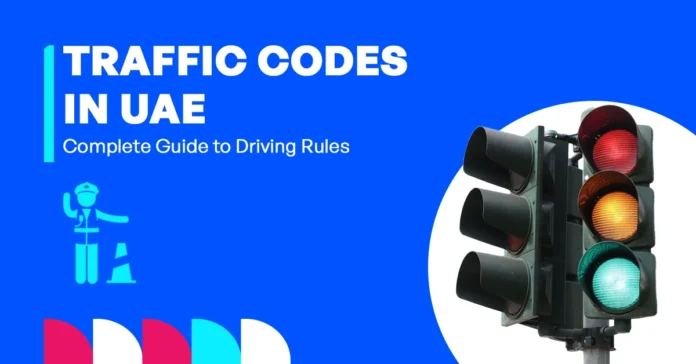Driving safely in the UAE means mastering the traffic codes in UAE and learning the unwritten driving codes in UAE—rules that protect lives, prevent fines, and even lower car insurance costs, along with codes that create a safe driving environment for everyone. These include speed limits, zero-tolerance drunk driving policies, non-compliance risks, legal penalties, and license suspension. Let’s break down critical regulations, exceptions, and expert tips to help you navigate UAE roads confidently while avoiding costly mistakes.
Understanding Traffic Codes in UAE: Speed Limits and Enforcement
The Driving Codes in UAE are designed to ensure safety and order on the roads, but they’re not one-size-fits-all. While most rules are strict, exceptions exist for emergencies, specific types of vehicles, or unique situations. Below, we break down the must-follow regulations and highlight key exceptions to help you avoid fines, protect your car insurance in UAE coverage, and drive with confidence.
Speed Limits and Traffic Codes in UAE Highways
- Standard Rule: Highways: 120–140 km/h; urban areas: 40–80 km/h. Exceeding the limits by 80+ km/h risks vehicle impoundment. Radar cameras also enforce rules.
- Exceptions: Buses and trucks often have lower limits (e.g., 80 km/h on some highways). There are also variable speed limits in fog and rain (displayed on electronic signs).
Seat Belt Laws and Child Safety

- Standard Rule: All passengers must buckle up; children under 10 years or 145 cm require car seats. Non-compliance impacts car insurance claims in UAE during accidents.
- Exceptions: Taxi passengers over 145 cm may skip car seats (varies by emirate). Pregnant women with medical certificates can adjust their seat belts.
Distracted Driving: UAE’s Stance on Mobile Phones and More

- Standard Rule: No handheld calls/texts. No eating while driving.
- Exceptions: Hands-free devices (e.g., Bluetooth) are allowed. GPS adjustments are permitted only if the vehicle is stationary.
Zero-Tolerance for Drunk Driving: UAE’s Strict Policies

- The Standard Rule is a 0.00% blood alcohol limit for residents. DUIs void car insurance in UAE for accidents. Zero tolerance applies regardless of religion.
- Tourists: While federal law allows a 0.02% blood alcohol limit for non-Muslim visitors in some emirates, Dubai and Abu Dhabi enforce 0.00%. Tourists in Sharjah/Ajman may fall under the 0.02% federal rule, but enforcement varies. Always assume 0.00% to avoid legal risks. Rental car companies may impose additional fines or bans if you get caught drunk.
- Exceptions: None—prescription drugs affecting driving ability are also banned.
Pedestrian Safety and Lane Discipline in the UAE

- Standard Rule: Always stop at zebra crossings. Stay in lanes; sudden swerving is extra fine!
- Exceptions: Pedestrians must not cross suddenly outside marked areas.
Vehicle Maintenance Standards Under Traffic Codes in UAE
- Standard Rule: Annual inspections are mandatory (Dubai/Abu Dhabi). Faulty brakes/tyres risk fines.
- Exceptions: New vehicles (<3 years old) may skip inspections in some emirates.
Parking Regulations Under Traffic Codes in UAE
- Standard Rule: No parking on yellow lines, bus stops, or disabled spaces. Use paid parking apps in cities; expired tickets cost AED 150. Illegally parked cars may be towed, complicating car insurance in UAE claims.
- Exceptions: Emergency stops are allowed with hazard lights on (briefly).
Overtaking and Roundabout Rules

- Standard Rule: Overtake only from the left; yield to vehicles inside roundabouts.
- Exceptions: On multi-lane highways, overtaking from the right is permitted if lanes are clear.
Consequences of Violating Traffic Codes in UAE: Fines, Penalties, and Legal Risks
The traffic codes in UAE enforce accountability through a black points system, a mechanism designed to penalize reckless behavior and promote safer roads. Every violation of Driving Codes in UAE adds a specific number of black points to your license, with penalties escalating as points accumulate.
UAE Black Points System: How Violations Affect Your License
Let’s try an example to understand how this system works. For instance, speeding can result in 4–12 points depending on the severity, while ignoring pedestrian rights at crossings can add 6 points. Reach 24 points within a year, and your license faces suspension for 3–12 months, leaving you unable to drive legally. Repeat offenders risk having their licenses permanently revoked, a career-ending blow for professional drivers.
Severe Penalties for Reckless Driving and DUIs
In the UAE, reckless driving and DUIs are not just illegal; they’re societal taboos. The Driving Codes in UAE penalize actions like tailgating, illegal overtaking, or ignoring traffic signals with fines up to AED 30,000, 23 black points, and mandatory vehicle impoundment.
For DUIs, the stakes are higher: residents face a strict 0.00% alcohol policy, with violations leading to license revocation, jail time, and permanent marks on criminal records. Though sometimes shielded by a 0.02% federal limit, tourists must tread carefully—Dubai and Abu Dhabi’s zero-tolerance enforcement leaves no room for error. These violations also cripple your financial safety net.
Here is a complete list of fines and black points for each violation:
| Violation Type | Fine (AED) | Black Points | Additional Consequences |
| Speeding | 300– 3,000 | 4–24 | Vehicle impoundment (1–30 days) for exceeding limits by 80+ km/h. |
| No Seat Belt | 400 per person | 4 | Impacts car insurance in UAE claims if proven to be contributory to injuries. |
| Distracted Driving (Phone) | 800 | 4 | Repeat offenders face higher fines and license suspension. |
| Drunk Driving | 20,000+ | 23 | License suspension (1–12 months), jail time, and voided car insurance in UAE coverage. |
| Ignoring Pedestrians | 500 | 6 | License suspension for repeat violations. |
| Faulty Vehicle Maintenance | 500 | – | Failed inspections block registration renewal; accidents may void car insurance in UAE. |
| Illegal Parking | 150– 1,000 | – | Towing fees (AED 500–1,200); impoundment (7 days) for blocking traffic. |
| Wrong Overtaking | 400– 600 | 4 | Accidents caused by improper overtaking lead to liability in insurance claims. |
| Running Red Lights | 1,000 | 12 | Vehicle impoundment (30 days) + mandatory court appearance. |
How UAE Traffic Codes Impact Car Insurance and Legal Standing
After years of working in the insurance industry here, I’ve learned that your driving habits don’t just affect your safety, they shape your car insurance in UAE costs more than you might think. I’ve seen careful drivers save thousands annually, while others drown in premium hikes after just one reckless mistake. Here’s how it works and how you can stay on the right side of the equation.
Safe Driving Discounts
Insurers here love safe drivers. Why? Fewer claims, fewer risks. If you’ve got a clean record, ask about:
- Telematics programs: Install a device (or app) that tracks your speed, braking, and cornering. By driving smoothly, I’ve seen clients cut premiums by 15–20%.
- Defensive driving courses: Complete an accredited course (like the ones offered by Emirates Driving Institute), and insurers might offer a discount of 8–10%. I always recommend this to young drivers. It’s a win for safety and savings.
- Loyalty perks: Stick with one insurer for 2+ years. Many reward you with incremental discounts.
But here’s my tip: Review your policy annually. Last year, I realized my insurer had a “violation-free” discount I wasn’t even claiming. A 10-minute call saved me AED 800.
Traffic Violations and Car Insurance Premiums
One of my friends, who thought a speeding ticket (AED 600 + 4 black points) was “no big deal.” At renewal, his car insurance in UAE premium jumped 22%, costing him an extra AED 1,200/year. That’s the hidden tax of ignoring Traffic Codes in UAE.
Here’s the hard truth insurers won’t always spell out:
- Minor violations (e.g., parking fines) might not hurt immediately, but three or more in a year flag you as “risky.”
- Major violations (DUIs, reckless driving) can double your premium or get you dropped entirely. One expat I worked with paid AED 12,000 out of pocket after his DUI voided coverage for a fender-bender.
- Black points are silent killers: Hit 12+ points? Insurers see you as a liability. I’ve had clients forced into “high-risk” pools with premiums 40% higher than standard rates.
My advice? Treat every drive like it’s being graded because to insurers, it is. Use the MOI app to check your violations monthly. Dispute errors fast. I once saved a client AED 3,000 by proving a radar ticket was misread.
Why Compliance with Traffic and Driving Codes in UAE Matters
Adhering to traffic codes and driving codes in the UAE isn’t just about avoiding fines—it safeguards your license, ensures lower car insurance premiums in the UAE, and prioritizes road safety for all. By staying informed and driving responsibly, you protect your finances, legal standing, and, most importantly, your life.
Informative Blogs:
Frequently Asked Questions
What is the traffic code in UAE?
The UAE Traffic Code, established under Federal Law No. 21 of 1995 (and subsequent amendments), governs road safety, vehicle standards, driver conduct, and penalties for violations. It includes rules on speed limits, seat belts, drunk driving, and the use of mobile devices while driving.
What are the requirements for driving in the UAE?
Valid residency visa (for expats) or Emirates ID.
Minimum age: 18 for light vehicles, 20 for motorcycles, 21 for heavy vehicles.
A valid UAE driving license (or an international license for tourists).
Passing a vision test and medical exam (for new licenses).
Vehicle insurance is mandatory.
What are the UAE road safety rules for drivers?
Mandatory seat belts for all passengers. Speed limits vary by road (e.g., 140 km/h on highways). Zero tolerance for drunk driving (blood alcohol limit: 0.00%). No mobile phone use while driving. Children under 4 years old must use car seats. Pedestrian priority at designated crossings.
What is the 3-second rule driving the UAE?
It is one of the driving codes in UAE for maintaining a safe following distance: Drivers should stay 3 seconds behind the vehicle ahead to account for reaction time. This gap should be increased in adverse weather.
What is Article 51 of the UAE traffic law?
Article 51 outlines penalties for traffic violations, including fines, license suspension, and vehicle impoundment. Examples include reckless driving, speeding, and running red lights.
What is Article 378 of the UAE Code?
Part of the Federal Penal Code (Law No. 3 of 1987), Article 378 addresses causing death or injury due to negligence. Penalties include imprisonment, fines, and license revocation.



